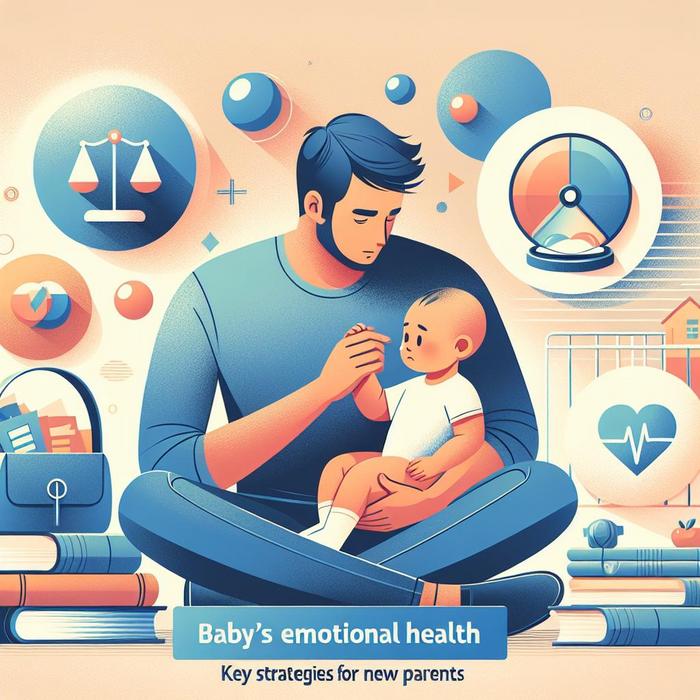Nurturing Your Baby’s Emotional Health: Key Strategies for New Parents
Understanding Your Baby’s Emotional Health
Parents play a pivotal role in shaping and nurturing their baby’s emotional health. A child’s emotional well-being is just as important as physical wellness. By cultivating a strong emotional bond, parents set the stage for their child’s future interpersonal relationships, self-esteem, and mental health. Seattle Children’s provides useful resources to guide new parents through this journey.
Importance of Nurturing Emotional Health
When we talk about babies’ emotional health, we refer to their ability to:
- Create and maintain relationships
- Experience, manage, and express emotions
- Explore the environment and learn
Being aware of the importance of emotional health can set your baby for a positive progression. To understand more about the significance of emotional health, read this research paper.
Effective Parenting Tips for Promoting Emotional Health
Promoting your baby’s emotional health doesn’t have to be a complex process. Here are few simple parenting tips:
Secure Attachment
Secure attachment refers to a strong emotional bond between a child and caregiver. An infant with a secure attachment feels safe to explore their surroundings and expresses emotions freely. Refer to this parenting guide to learn how to promote secure attachment.
Consistent Response
Responding consistently to your baby’s needs helps them to feel understood and secure. This can be as simple as feeding them when they are hungry, soothing them when they are upset, or changing their diaper when they are uncomfortable.
Express Emotions
Encourage your baby to express their emotions, both positive and negative. This can help them to understand and manage their feelings, promoting emotional well-being.
Physical Contact
Physical contact, such as hugging and holding, can provide emotional security for your baby. It can foster feelings of love, safety, and comfort. This article explains more about the importance of physical contact.
Nurturing Social Skills in Infant Stage
As your baby grows, their interaction with the environment and people around them will start to evolve. These interactions will play a significant role in shaping their social skills. To help them develop these skills at an early age:
- Play with them regularly
- Explain emotions and feelings
- Encourage interactions with other children
Check out Michigan’s miKidsMatter for more tips on nurturing social skills.
Solving Sleep Issues in Infants
Sleep problems can interfere with your baby’s emotional health. A lack of sleep can make them irritable, leading to emotional instability. Regular sleep routines and creating a conducive sleeping environment are key to solving sleep issues. You can find more detailed information in this article.
Nurturing baby emotional health is an ongoing journey that might not always be easy, but it’s certainly worth it. You are not alone in this journey; reach out for support when you need it. Utilize online resources, connect with other parents, and seek professional advice when necessary.
Remember, every baby is unique. What works for one might not work for another. Be patient, keep learning, stay responsive, and above all, fill your baby’s life with love. Love is, after all, the most potent tool for nurturing emotional health.
Harnessing Your Patience
Your baby’s emotional health cultivation requires a consistent display of patience. Aim to ensure that you’re not rushing interactions with your baby or trying to curtail their emotions or actions prematurely. In this respect, patience is more than a virtue; it’s a necessary tool. Underscoring the importance of patience, Oklahoma State University Extension shares valuable insights.
Power of Routine
Implementing and maintaining a consistent daily routine can have profound impacts on your baby’s emotional health. Predictable patterns and schedules, such as regular meal times and bedtime routines, can facilitate a sense of security and trust in your baby. An organized daily routine helps babies feel a sense of control over their environment, reducing stress and promoting emotional well-being. For hands-on guidance on daily routines, refer to this Zero to Three resource.
Importance of Play
Play is a crucial aspect of your baby’s emotional health. It’s through play that babies begin to understand their world and learn how to navigate their environment. Encourage your baby to play by:
- Providing age-appropriate toys
- Engaging in interactive games
- Offering items with different textures, colors, and sounds
You can learn more about the benefits of play from this Developmental Science blog post.
Encouraging Lone Play
While interaction and play with others is critical, it’s equally important to encourage independent play. This serves as a foundation for building self-reliance and boosts your baby’s confidence and problem-solving skills. Allowing your baby some time to play alone also provides them with the opportunity to explore their curiosities and interests at their own pace.
Modeling Healthy Emotions
Babies, especially as they grow, begin to mirror the emotions and behaviors they observe. Therefore, it’s crucial to model healthy emotional expression in your interactions. By showing your baby how to react efficiently to various situations, you’re teaching them valuable emotional skills. For example, showing calmness in stressful situations can teach your baby how to manage challenging emotions.
Ensuring Provision of Natural Environment
Exposing your baby to a natural, calm, and soothing environment contributes to a positive state of emotional health. An environment rich in natural light, green spaces, and calm noises is nourishing to the baby’s senses and fosters feelings of wellbeing. Highly important, your child’s surrounding influence their sensory development as explained in Virtual Lab School.
Practice Speaking with Your Baby
Speaking to your baby boosts their language development and fosters a strong emotional bond. Using a gentle tone of voice aids in expressing your love, while also exposing them to different pitches and tones, thus nurturing their emotional health.
Nurturing your baby’s emotional health is an intricate, continuous, rewarding process. Recognize the moments that bring you closer to your baby and don’t hesitate to ask for support when needed. As you guide your baby on their emotional journey, remember to celebrate the tiny milestones along the way.

